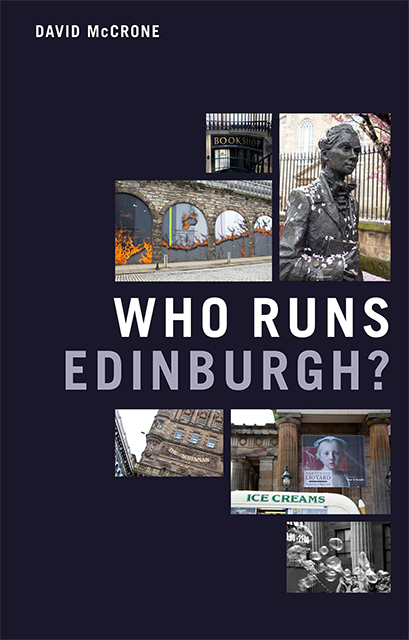Book contents
- Frontmatter
- List of Contents
- Figures and Tables
- Preface
- 1 Who Runs Edinburgh?
- 2 Politics in Edinburgh
- 3 Winners and Losers: The Political Economy of Edinburgh
- 4 Treading Angels: Edinburgh and its Festivals
- 5 Are You One of Us? Status in the City
- 6 What School did You Go To? Education and Status in Edinburgh
- 7 Enlightened City: Cultural Power and University Life
- 8 Developing Edinburgh: Pies in the Sky, Holes in the Ground
- 9 Lost in Leith: Accounting for Edinburgh’s Trams
- 10 Does Anyone Really Run Edinburgh?
- Bibliography
- Index
4 - Treading Angels: Edinburgh and its Festivals
Published online by Cambridge University Press: 25 October 2023
- Frontmatter
- List of Contents
- Figures and Tables
- Preface
- 1 Who Runs Edinburgh?
- 2 Politics in Edinburgh
- 3 Winners and Losers: The Political Economy of Edinburgh
- 4 Treading Angels: Edinburgh and its Festivals
- 5 Are You One of Us? Status in the City
- 6 What School did You Go To? Education and Status in Edinburgh
- 7 Enlightened City: Cultural Power and University Life
- 8 Developing Edinburgh: Pies in the Sky, Holes in the Ground
- 9 Lost in Leith: Accounting for Edinburgh’s Trams
- 10 Does Anyone Really Run Edinburgh?
- Bibliography
- Index
Summary
And another thing. In August the city grows,
Groans more, and weighs more. It shows.
Bus stops, taxi stances, sprout linguists endlessly
Who all speak a common language called
Waverley
(mac Neil 2000: 100)How did Edinburgh come to be ‘festival city’? Consider this opening comment in the 2018 report by the consulting company BOP: ‘Edinburgh is an undisputed world leader as a festival city. The innovation and momentum of its Festivals inspire people from local audiences through to international cultural peers.’ (BOP Consulting 2018: 2). The report continues:
Edinburgh's identity as a festival city has been built over the past 70 years to its current position as an acknowledged world leader. Its individual festivals are leading cultural brands in their respective fields; collectively, they attract audiences in excess of 4.5 million and have an economic impact of £313 million annually. (BOP Consulting 2018: 3)
We have grown used to cultural boot-strapping in the modern world, as cities reinvent themselves to put distance between themselves and their industrial past. Bilbao has its Guggenheim museum, a catalyst for cultural regeneration. Glasgow, Edinburgh's near-neighbour is, these days, miles better, and has reinvented itself as city of culture.
The competition, though, is a cut-throat business. The consulting company BOP called its 2015 report Thundering Hooves, ‘metaphorically named after the sound of the competition catching up with Edinburgh’, but ‘Edinburgh is the undisputed world leader as a festival city’, and no amount of catch-up by other places will alter that, it argues. Still, by 2018, that ‘the’ has become ‘an’, just in case any other place has pretensions to the cultural crown.
This chapter will examine how Edinburgh has been ‘branded’, and with what effect; examine the origins of the ‘official’ Festival; look at ‘festival adjuncts’, better known as the Fringe; the role of the Traverse Theatre; and what it all means in terms of living with these things. In the classical ‘you’ll have had your tea’ mode Edinburgh is infamous for, we might agree with the anonymous citizen who commented: ‘I quite liked the Festival, I even enjoyed it. All in all, we were none the worse for it.’
BRANDING PLACE
The origins and development of Edinburgh as ‘festival city’ is a form of modern branding, an ongoing process of ‘place-making’, of cultural boosterism.
- Type
- Chapter
- Information
- Who Runs Edinburgh? , pp. 81 - 111Publisher: Edinburgh University PressPrint publication year: 2022

